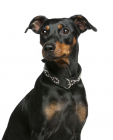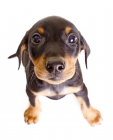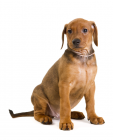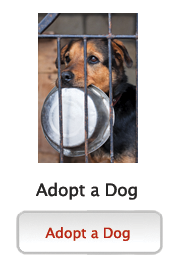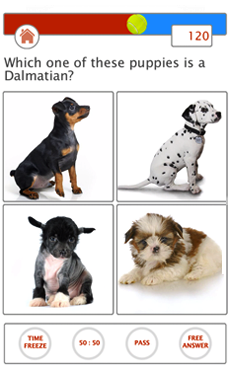German Pinscher
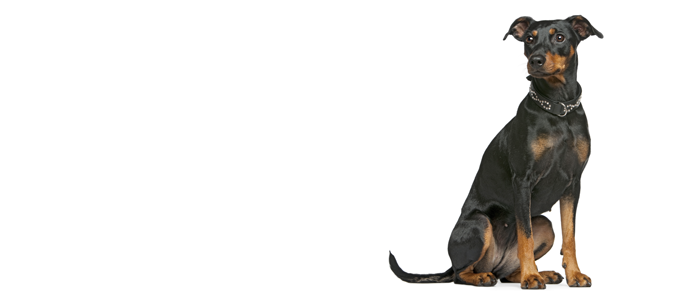
In my own words
“When I go out I love to run and run, but when I’m home I’m happy to relax by your side!”
I’ve got to be honest; there are two very different sides to my personality. On the one paw, I’m bursting with energy and have heaps of stamina. On the other paw, I’m docile and relaxed!
Let me explain… when we go on our daily walks I love nothing better than running around like crazy. I love to hunt and if I see a small animal that catches my eye, you can be sure I’ll chase it for as long as I can! But I also have a lot of love to give, and when we get home all I want to do is cuddle up next to you and laze about.
I guess that’s why people tell me I’m so adaptable – I really can fit right in with your lifestyle. If you’re always on the go then I will be too! But if you’re more of a home bird and prefer to watch TV than go on a hike, I’m perfectly content watching TV with you. Just make sure you give me the chance to burn off some steam with a good walk now and again, OK?
My ideal owner(s)
Families with older children
Couples
Active people
People who like to jog
Country folk
What they say about me
Intelligent
Hard working
Energetic outside
Docile around the house
Obedient
Please read on to find out more about me, and whether I’ll be someone you’ll be happy to live with for the next 14 years!
Is this German Pinscher for you?
Test your knowledge about the German Pinscher
Information essential about the German Pinscher
Kennel Club Group:
Working
Size:
Medium: Weight Male 25 – 35 lb (11 – 16 kg) Female 25 – 35 lb (11 – 16 kg)
Height Male 17 – 20” (43 – 51 cm) Female 16 – 19” (41 – 48 cm)
Popularity:
The German Pinscher is slowly becoming a more popular breed. It was accepted into the American Kennel Club in 2003 and has gained popularity in North America since then. However, the breed is much more popular in its native country of Germany, where the breed was accepted into the Kennel Club in 1879.
Breed History:
The German Pinscher originates from Germany, and there is evidence of the breed in drawings dating back to 1780. While the exact mix of breeds which created the German Pinscher are unknown, it is thought that they were bred from a variety of ratters which were well established in the German countryside and had been working on farms as vermin hunters as far back as the 1400s.
During the 1830s, German Pinschers became extremely popular in Germany and became more popular than the much loved Mops. The breed was set to work and was commonly used to guard coaches, however they were also used in the home to hunt and kill vermin like rats. Their rat hunting skill has been bred into them and is a natural instinct which they still possess today.
Originally, the Standard Schnauzer and German Pinscher were considered the same breed but with different coats. However, after many years of careful breeding, three generations of the same smooth coated Pinscher were born and the varieties were classed as different breeds.
Between 1950 and 1958, no German Pincher litters were registered and the breed seemed to be in danger of extinction. An enthusiastic breeder called Waerner Jung collected several German Pinschers and managed to revive the breed, creating the German Pinscher we know and love today. However, there are a few varieties of German Pinscher which are now extinct; the Harlequin Pinscher, the Swiss Shorthair Pinscher and the German Silky Pinscher
Character:
Alert and energetic, your German Pinscher is incredibly playful and loves to burn off steam by getting a good daily walk. German Pinschers are lively dogs and have a huge amount of stamina, but can be calm and docile when at home, although he loves to run like the wind when he’s outside exercising. A true companion dog, your German Pinscher is happiest when he’s by your side. He loves to have company and is wonderfully loyal to his family, as well as fiercely protective of them. Though your German Pinscher is generally a quiet dog, he’ll waste no time in raising the alarm with a good solid bark if he senses trouble or danger. This, tamed with his brave nature, makes him an excellent guard and watch dog. When well socialised throughout puppyhood and adulthood, your German Pinscher will get on well with both children and other pets.
Temperament:
The German Pinscher generally has a well-mannered, loving and even temperament. They are affectionate companions and should be fairly friendly with strangers, although they might be wary of visitors at first and bark they will soon calm down and relax. Your German Pinscher is not only incredibly intelligent, but also quite independent. This means that while they can pick up new things easily, they like to be challenged during training and get bored with a lot of repetition. Therefore, you need to make training fun and interesting in order to get the best out of your German Pinscher.
Conformation:
The German Pinscher has a sturdy, medium sized frame with a strong yet graceful appearance. Their skulls are long and flat with a pointed muzzle and muscular cheeks. The medium sized eyes are darkly coloured and oval shaped. The ears are erect and set high. Svelte, elegant necks slope down to a short backs and a flat top-line, while the tail is carried high. The coat is short and dense, with a glossy look.
Colour:
The German Pinscher has a silky, shiny coat which commonly comes in fawn, red, brown and yellow, and black and tan
Training:
Your German Pinscher is very intelligent, so although he can pick up training easily he can also become bored if the training isn’t exciting or challenging enough for him. Your German Pinscher doesn’t like a lot of repetition so it’s best to keep training sessions short and to the point, and have more of them, than to try and engage your German Pinscher in one long training session every now and again. With the right training and a confident owner, your German Pinscher will do exceedingly well in obedience.
Care:
An average shedder, the German Pinscher is an incredibly easy breed of dog to groom. All he requires is an occasional brush to remove dead or lose hair. The German Pinscher is a clean breed and should only be bathed when absolutely necessary.
Health:
It is important to check your new puppy or dog’s family history for health issues before purchasing him. German Pinschers come from a small gene pool, which means they are prone to a number of genetic health problems including cataracts, hip dysplasia, Von Willebrand Disease and Thyroid problems. Irresponsible breeding has also led to a number of dogs having cardiac disease. The average lifespan of a German Pinscher is approximately 14 years.
You may also like:
If you like German Pinschers, you may be interested in breeds of the same size »
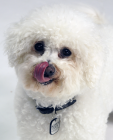
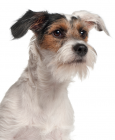
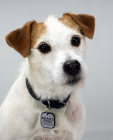
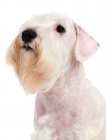
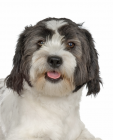
If you like German Pinschers, you may like other breeds with similar characteristics »
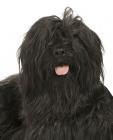
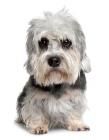
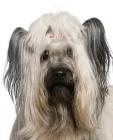
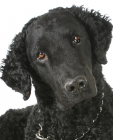
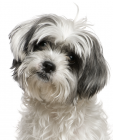
If you like German Pinschers, you may be interested in these other working dogs »

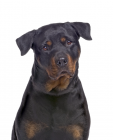
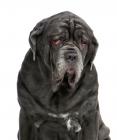
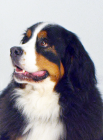
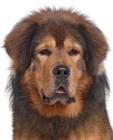
Advice on choosing your breed »
Find an animal shelter or rescue home where a German Pinscher is waiting for a new home »
The following grid gives a fast track review which covers all breeds. You can apply it to help you decide if a German Pinscher is suitable for you, the environment where you live, your personality and your lifestyle. On the grid, 1 = strongly disagree, and 5 = strongly agree. For example, if you are looking for a dog that would make a good watch dog, look down the list under ‘role and suitability’ and you will see that German Pinschers make great watchdogs, scoring 5. If you are looking for a dog that you can take on jogs with you, look under ‘activities’ and you’ll see a German Pinscher would be an excellent choice, scoring 5 under ‘goof jogging companion’. You might like to save or print off this section and keep it for reference while you check some other breeds before making your choice.
Be the first to rate this breed »
|
*PLEASE NOTE: All our breed profiles are general, and all dogs are individuals. Always talk to the breeders and meet the owners you are buying from. Try to meet the dog and its parents if it is a puppy in their home environment.








